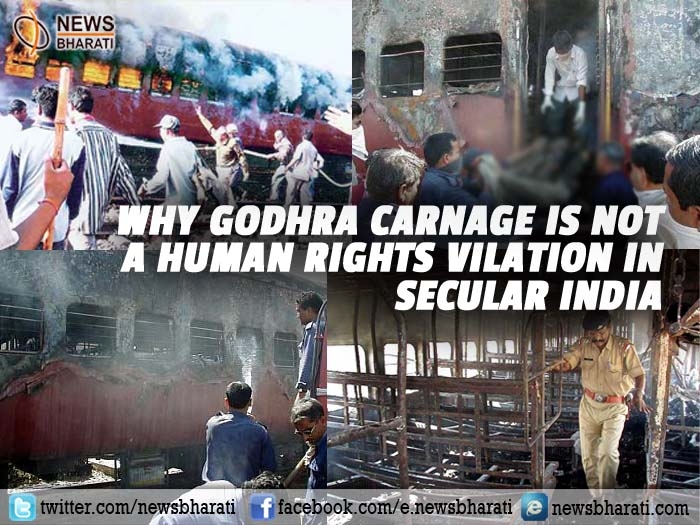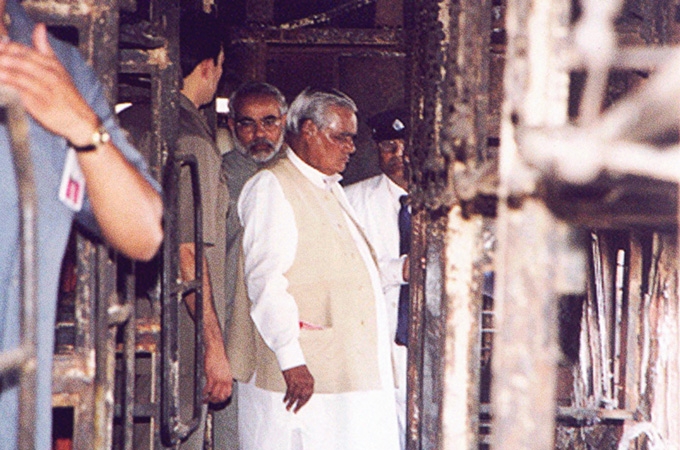Why #GodhraCarnage not a Human Rights story in Secular India?
Ahmadabad, February 27: “.... Conspiracy to burn Coach S-6 and on 27/2/2002 as per the previous plan a mob consisting of more than 900 muslim persons attached on Sabarmati Express Train with weapons like sticks, iron pipes, Dharias, Guptis and also started pelting stones, acid bulbs, bottles, burning rags etc., on the train coaches.
The learned Judge also found that the members of the crowd were instigated by making pronouncement of loudspeakers from nearby Ali Masjid and due to such tense atmosphere the passengers of the train were restrained/prevented from escaping from the coach, even on 'Off side of the train’.”
“Some of the accused entered Coach S-6 by cutting canvass vestibules of Coach S-7 and after forcibly opening sliding door of coach S-6 and East-South corner door of Coach S-6 carboys filled with petrol came to be emptied in the coach and thereby using a burning rag set the coach S-6 on fire.”

Those are not mere allegations from any Hindu extremist (the coined term of seculars) organisation or their publication; those are the observations made by the learned Judge expressed in verdict dated examining 257 witnesses, on appreciation of the availed evidence.
The case is “Salim vs State” in Gujarat High court and it’s about the most unfortunate, most aghast incident on 27 February 2002 at Godhra station in which a violent crazy mob of 900 Muslim persons who burned the S6 coach of the train, just to kill Ram Bhakt Karsevaks, comprising of women and kids returning from Ayodhya.
No Human Rights champion came forward to weep for the innocent lives, like they wept to play a vital political role in the riots which was an outcome of the Godhra killings. It is surprising for Indian populace to see how a certain leftist secular of media, intellectuals and human rights activists shun the bloody brutality by Muslim mob in Godhra and how hyped its reaction – the Gujarat riots - to spark political flame against the then BJP Chief Minister of Gujarat, Narendra Modi.

The conspiracy behind Godhra carnage
After examining 257 witnesses, on appreciation of the said evidence the learned Sessions Judge, came to the conclusion that there was a conspiracy to burn Coach S-6 and on 27 February 2002 as per the previous plan a mob consisting of more than 900 Muslim persons attached on Sabarmati Express Train. We find it all recorded as the observations of the Sessions Judge, in the 17/02/2012 Gujrat High court ruling.
The insane mob attacked the S-6 coach attacked with weapons like sticks, iron pipes, Dharias, Guptis and also started pelting stones, acid bulbs, bottles, burning rags etc., on the train coaches. The members of the crowd were instigated by making pronouncement of loudspeakers from nearby Ali Masjid and due to such tense atmosphere the passengers of the train were restrained from escaping from the coach, even on 'Off side of the train".
The conspiracy was hatched by 5 accused, namely, (1) Salim alias Salim Yusuf Jarda, (2) Saukat Ahmed Charkha alias Lalu, (3) Salim Haji Ibrahim Badam alias Salim Panwala (absconding accused), (4) Jabirbin Yamin and (5) Abdul Razak Kurkur who met together on 26/2/2002 at about 9 p.m., at Room No.8, Aman Guest House in Godhra.
The FIR which was registered as C.R. No.I-9/2002 at Godhra Railway Police Station on 27/2/2002 relate to a most unfortunate incident. It says that the unfortunate event happened at Godhra Railway Station in Sabarmati Express Train where fire engulfed lives of 59 passengers at about 8.00 a.m., and about 48 passengers sustained injuries when Coach S-6 was in flames.
Seven cans of Petrol were purchased from the petrol pump of Kalubhai and those containers were transported to Aman Guest House in Rickshaw No.GJ-6-U-8074. Those cans were unloaded at the residence of accused Abdul Razak Kurkur. Accused Bilal Ismail Abdul Majid alias Bilal and Farooq Mohammad Bhana had conveyed the message of Maulvi Hussain Haji Ibrahim Umarji to others at Aman Guest House to burn the Compartment S-6 of Sabarmati Express Train. That on receipt of the information of late arrival of Sabarmati Express Train, the accused persons had decided to meet at about 6.00 to 6.30 a.m., on 27 Feb 2002 at Aman Guest House.
While giving his verdict, the Judge also found that some of the accused entered Coach S-6 by cutting canvass vestibules of Coach S-7 and after forcibly opening sliding door of coach S-6 and East-South corner door of Coach S-6 carboys filled with petrol came to be emptied in the coach and thereby using a burning rag set the coach S-6 on fire. The learned Judge further found that by this act, 59 passenger Kar Sevakas died and about 48 persons sustained burns or other injuries.
I have seen my parents and sisters being burnt alive right in front of my eyes, says GayatriGayatri, the only survivor out of her family of ten was a part of the Karsevaks returning from Ayodhya. She recounts the horrible event as: “On the 27th morning, at around 8 a.m. the train left Godhra Station. The karsevaks were loudly chanting the Ram Dhoon. The train had hardly gone ½ Km., when it suddenly stopped. Somebody had perhaps pulled the chain to stop the train. Before anybody could know what had happened, we saw a huge mob approaching the train. People were carrying weapons like Gupti, Sphere, Swords and such other deadly weapons in their hands and were throwing stones at the train. We all got frightened and somehow closed the windows and the doors of the compartment. People outside were shouting loudly, saying “Maro, Kato” and were attacking the train. A loudspeaker from the Masjid close by was also very loudly shouting “Maro, Kato, Laden na dushmano ne Maro.” These attackers were so fierce that they managed to break the windows and close the doors from outside before pouring petrol inside and setting the compartment on fire so that nobody could escape alive. A number of attackers entered the compartment and were beating the karsevaks and looting their belongings. The compartments were drenched in petrol all over. We were terrified and were shouting for help but who was there to help us? A few policemen were later seen approaching the compartment but they were also whisked away by the furious mob outside. There was so much of smoke in the compartment that we were unable to see each other and also getting suffocated. Going out was too difficult; however myself and Pooja somehow managed to jump out through the windows. Pooja was hurt in her back and was unable to stand up. People outside were trying to hold us to take us away but we could escape and run under the burning train and succeeded in crawling towards the cabin. I have seen my parents and sisters being burnt alive right in front of my eyes.” Luckily, by the grace of God, Gayatri was not hurt too badly. “We somehow managed to go up to the station and meet our aunty (Masi). After the compartments were completely burnt the crowd started withering. We saw that even amongst them were men, women and youngsters like us both male as well as female. I returned here after evacuating the dead bodies of my family members at Godhra Station. Out of 18 of us ten had laid their lives.” Gayatri’s father was a carpenter whereas her mother worked in the Madhyanha Bhojana Yojna (i.e. Mid-day meal scheme), her elder sister Pratiksha was serving in the Collectorate. In spite of what had happened, Gayatri still feels that she would any time once again venture to go for karseva. She says, “I shall not allow the sacrifice of my parents to go in vein.” (http://www.gujaratriots.com/index.php/2008/05/account-of-a-16-year-old-survivor/) |
Court Verdict
On February 2011, the trial court convicted 31 people and acquitted 63 others, saying the incident was a “pre-planned conspiracy". The convictions were based on the murder and conspiracy provisions of Sections 302 and 120B of the Indian Penal Code respectively and under Sections 149, 307, 323, 324, 325, 326, 332, 395, 397, and 436 of the Code and some sections of the Railway Act and Police Act.
The death penalty was awarded to 11 convicts; those believed to have been present at a meeting held the night before the incident where the conspiracy was formed, and those who, according to the court, had actually entered the coach and poured petrol before setting it afire. Twenty others were sentenced to life imprisonment.
Those acquitted by the trial court include the prime accused Maulana Umarji, Mohammad Hussain Kalota, who was president of the Godhra Municipality at the time, and Mohammad Ansari.
The 31 persons convicted in the case, including 11 who were awarded the death sentence, have also filed appeals in the High Court. The application for the confirmation of the death sentences -- a death sentence has to be confirmed by the High Court -- is also before the Court.
Interpol red corner notice for Salim Haji
The Interpol has issued a red corner notice for the arrest of Salim Haji Ibrahim alias Salim Paanwala, the main accused in the Godhra carnage. Intelligence sources said Salim Paanwala is in Pakistan, which indicates that the Inter-Services Intelligence (ISI) may have a hand in the Godhra carnage.
Slap on conspirators who shield Muslim perpetrators
Notably, the notice issued on April 11 is a humiliation for Justice UC Banerjee Committee and then railway minister Lalu Prasad Yadav, who tried to bury the crimes of the Muslim mob against Hindus and he committee who termed the Godhra massacre as a mere accident.
The fact sheet recognized in Interpol's notice says:
“On February, 2002, an attack occurred on Sabarmati Express which was travelling between Muzaffarpur to Ahmedabad. The attack on the coach no S-6 of the train was pre- meditated and resulted in serious injury to 46 passengers and death to 59 passengers. As the train pulled away from Godhra station where it had a scheduled stop, four chains were pulled in four different carriages, causing the train to stop.
"Investigations have revealed that during the time the train was stopped, the offenders collected eight canisters of petrol from the nearby co-conspirator. Shortly afterwards, the four emergency chains were pulled again and the train halted. Investigations have revealed that pulling of the emergency chains was part of a plan. As soon as the train stopped, it was attacked by mobs outside, who pelted it with rods and broke windows and attacked it with arms and inflammable material."
16 Years after
The massacre at Godhra station of innocent Kar Sevaks was an incident that occurred on the morning of 27 February 2002. The horrified Godhra massacre of innocent Hindus triggered another unfortunate episode of Gujarat riots. Interestingly, the 2002 Gujarat riots in which 790 Muslims and 254 Hindus got killed in communal violence from both sides, was made a matter of shame, by the Congress party and its pawns in the hood of journalist and rights activists.
16 Years after, the Godhra massacre remains a forgotten story around which many rumours got engulfed. It's still not a human rights story for many!
